 After receiving his Ph.D. in Cell Biology in 2004, Simon Alberti performed a postdoc with Dr. Susan Lindquist at the Whitehead Institute for Biomedical Research (Cambridge, USA), investigating prions and amyloids. During his post-doc, he identified important features that drive protein aggregation, and he characterized new prions that generate heritable phenotypic diversity in yeast. In 2010 he joined the Max Planck Institute of Molecular Cell Biology and Genetics (Dresden, Germany) to initiate his career as an independent scientist, focusing on the molecular and physical principles that organize the cytoplasm. His goal is to understand how cells adapt to environmental perturbations and stress by reorganizing the cytoplasm and forming membraneless compartments via a novel biophysical process known as phase separation. His lab showed that the physical properties of cytoplasm are widely adjustable and can be modified locally and globally by forming condensates that cover a continuum of physical states from liquid to gel to solid. The ability to assemble condensates endows cells with spatiotemporal control over diffusion-limited biochemical processes. Most importantly, he discovered that the initially beneficial ability to form condensates becomes detrimental with increasing age. This is because many condensate-forming proteins are sensitive to changing conditions and tend to assemble into aberrant condensates that cause aging-associated diseases. This suggests a new model for many diseases, where the physiological function and properties of condensate-forming proteins plays an important role in disease. In 2018, he accepted a position as Professor of Cellular Biochemistry at the Biotechnology Center (BIOTEC), Technische Universität Dresden, where he continues his work on the link between condensates, stress responses and age-related diseases.
After receiving his Ph.D. in Cell Biology in 2004, Simon Alberti performed a postdoc with Dr. Susan Lindquist at the Whitehead Institute for Biomedical Research (Cambridge, USA), investigating prions and amyloids. During his post-doc, he identified important features that drive protein aggregation, and he characterized new prions that generate heritable phenotypic diversity in yeast. In 2010 he joined the Max Planck Institute of Molecular Cell Biology and Genetics (Dresden, Germany) to initiate his career as an independent scientist, focusing on the molecular and physical principles that organize the cytoplasm. His goal is to understand how cells adapt to environmental perturbations and stress by reorganizing the cytoplasm and forming membraneless compartments via a novel biophysical process known as phase separation. His lab showed that the physical properties of cytoplasm are widely adjustable and can be modified locally and globally by forming condensates that cover a continuum of physical states from liquid to gel to solid. The ability to assemble condensates endows cells with spatiotemporal control over diffusion-limited biochemical processes. Most importantly, he discovered that the initially beneficial ability to form condensates becomes detrimental with increasing age. This is because many condensate-forming proteins are sensitive to changing conditions and tend to assemble into aberrant condensates that cause aging-associated diseases. This suggests a new model for many diseases, where the physiological function and properties of condensate-forming proteins plays an important role in disease. In 2018, he accepted a position as Professor of Cellular Biochemistry at the Biotechnology Center (BIOTEC), Technische Universität Dresden, where he continues his work on the link between condensates, stress responses and age-related diseases.
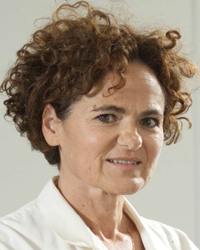 TB is Tenured Group Leader at the European Institute of Oncology (IEO) in Milan, where she directs the “Cancer epi- proteomics and gene expression regulation” Group since 2008. Following a PhD in Molecular and Cellular Biology at the Dibit, San Raffaele Institute in Milan, she did a first post-doc at the LMU in Munich, in A. Imhof’s lab, where she started developing MS methods to study the histone code; then she carried out a second post-doc in the M. Mann’s group at the MPI of Biochemistry in Martinsried to strengthen her expertise in quantitative MS-based proteomics and its potential to study post-transcriptional regulation of gene expression. She received the “Armenise-Harvard Career Development Award” in 2007 to develop her career as independent investigator in Italy. In 2010, she won the “International Inner Wheel for Women, for scientific achievements”. She successfully completed her tenure-track in 2014 and was appointed as Associate Professor at IEO. In 2021 she has also been appointed as Assistant Professor at the Department of Oncology and Hematology-Oncology of the University of Milan, where she coordinates the Proteomics and Metabolomics course for the Master Program in “Biomedical Omics” of the same University and she teaches Applied Biology at the Course Degree in “Health care professions”.
TB is Tenured Group Leader at the European Institute of Oncology (IEO) in Milan, where she directs the “Cancer epi- proteomics and gene expression regulation” Group since 2008. Following a PhD in Molecular and Cellular Biology at the Dibit, San Raffaele Institute in Milan, she did a first post-doc at the LMU in Munich, in A. Imhof’s lab, where she started developing MS methods to study the histone code; then she carried out a second post-doc in the M. Mann’s group at the MPI of Biochemistry in Martinsried to strengthen her expertise in quantitative MS-based proteomics and its potential to study post-transcriptional regulation of gene expression. She received the “Armenise-Harvard Career Development Award” in 2007 to develop her career as independent investigator in Italy. In 2010, she won the “International Inner Wheel for Women, for scientific achievements”. She successfully completed her tenure-track in 2014 and was appointed as Associate Professor at IEO. In 2021 she has also been appointed as Assistant Professor at the Department of Oncology and Hematology-Oncology of the University of Milan, where she coordinates the Proteomics and Metabolomics course for the Master Program in “Biomedical Omics” of the same University and she teaches Applied Biology at the Course Degree in “Health care professions”.
From a research point of view, at IEO TB focuses on applying mass spectrometry (MS) –based proteomics to the investigation of the molecular mechanisms underpinning adaptive responses in cancer, with a specific interest towards the epigenetic regulation of gene expression. Her research is contributing both various technological innovations and several original findings in the MS-analysis of chromatin composition and modifications, on histones and beyond, in both pre-clinical models and, more recently, in primary cancer patient samples. In the field of protein-methylation in cancer she is unravelling novel central roles of various epigenetic enzymes (e.g. LSD1, PRMT1) in the onset, progression and response to therapy for different cancer types and she has pioneered the epi-proteomics analyses of primary samples.
She is involved in the gender balance program of her Institute and IEO co-coordinator of the EU-Funded LIBRA project of the EU-LIFE consortium. At IEO she is involved in various institutional roles: Chair of the Scientific Council of the Dept. of Experimental Oncology, member of the Educational Committee and of the Academic Council of the School of Molecular Medicine (SEMM) PhD Program. She is partner of the EU-funded EPIC-XS consortium, to which she contributes both by developing novel analytical strategies for clinical epi-proteomics studies and by offering proteomics service for external user from EU.
She published more than 100 peer-review scientific papers (Google scholar h-index= 41, Citations: 11, 422). She’s married, with 2 children.
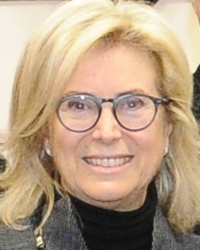 She graduated in Biology at the University “Sapienza” of Rome and she carried out her post-doc at the University of Zurich. The scientific activity developed in Rome at the C.N.R. and later at the “Sapienza” University where she is Full Professor since 1992. Since 2018 she is also Senior Researcher at the Italian Institute of Technology (IIT).
She graduated in Biology at the University “Sapienza” of Rome and she carried out her post-doc at the University of Zurich. The scientific activity developed in Rome at the C.N.R. and later at the “Sapienza” University where she is Full Professor since 1992. Since 2018 she is also Senior Researcher at the Italian Institute of Technology (IIT).
At "Sapienza" University she was: Director of the School for Advanced Studies, President of the Master's Degree in Genetics and Molecular Biology and Coordinator of the PhD in Genetics and Molecular Biology.
Since 2022 she is member of the board of Directors of the Scuola Normale Superiore of Pisa and of the “Comitato Direttivo” IFOM (Istituto Fondazione di Oncologia Molecolare).
Since 2020 she is member of the “Scientific Advisory Committee” of the European Molecular Biology Laboratory (EMBL) and, by government designation, of the “Selection committee for the presidents and members of the boards of directors of Italian Research Institutions”.
Since 2018 she is member of the “Management Committee” of the Human Technopole and of the “Advisory Committee” of the Armenise-Harvard Foundation.
In the past she has been member of the Board of the “National Museum of Science and Technology, Leonardo da Vinci" (Milan), of the committee “Programma per Giovani Ricercatori, Rita Levi-Montalcini” of MUR, of the Scientific Committee of the “Enciclopedia Treccani” and of the “Committee of Experts for the Research Policy” (CEPR), consultant of the Italian Ministry of University and Research.
She has received several awards including: the "Giovanna Jucci" and the "Tartufari" awards from the Accademia dei Lincei, and the Sapienza Ricerca Award in 2010. In 2008 she was invited to hold the "Lectio magistralis" for the inauguration of the academic year of La Sapienza.
She has been awarded of two ERC grants: an "Advanced Grant" in 2014 and a "Synergy Grant" in 2019.
She is the author of more than 170 publications and 8 patents.
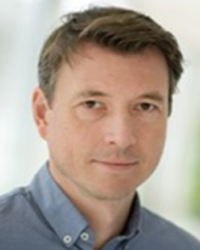 Elzo de Wit uses a combination of genomics methods and computational analysis to understand how genes are regulated, particularly within the context of the 3D genome. He received his PhD from the Netherlands Cancer Institute in Amsterdam and performed his post-doctoral research at the Hubrecht Institute in Utrecht. He is a co-founder of the biotechnology company Cergentis. In 2015 he started his independent group at the Netherlands Cancer Institute.
Elzo de Wit uses a combination of genomics methods and computational analysis to understand how genes are regulated, particularly within the context of the 3D genome. He received his PhD from the Netherlands Cancer Institute in Amsterdam and performed his post-doctoral research at the Hubrecht Institute in Utrecht. He is a co-founder of the biotechnology company Cergentis. In 2015 he started his independent group at the Netherlands Cancer Institute.
 Mirko Pinotti has a PhD in Biochemistry and is full-professor of molecular biology and Director of the Department of Life Sciences and Biotechnology at the University of Ferrara (Italy), and member of the Academic Senate.
Mirko Pinotti has a PhD in Biochemistry and is full-professor of molecular biology and Director of the Department of Life Sciences and Biotechnology at the University of Ferrara (Italy), and member of the Academic Senate.
His current research focuses on molecular bases of human genetic disease, with emphasis on coagulation factor disorders, and particularly on mechanisms acting at post-transcriptional (mRNA splicing) and translational levels. Main aim is also the development of innovative therapies based on splicing-switching molecules (patent PCT/IB2011/054573), non-viral gene delivery, base editing and protein engineering.
He received financial support from Telethon Italy, MUR (PRIN) and European Union (ENDOSCAPE H2020 project) and several competitive grants from pharmaceutical companies (i.e Bayer, Pfizer, NovoNordisk). In the field of novel therapies for coagulopathies he has been a consultant for pharmaceutical companies.
He has published over 120 papers in international peer-reviewed journals (h-index 34, mean IF>6), and he is reviewer for several of them.
 Alicia Estacio Gómez graduated from Biology at Universidad Autónoma de Madrid, Spain in 2007, where she stayed to obtain a PhD in Molecular Biology in 2014. She then moved to the UK, to join Imperial College London as a Postdoctoral researcher. During her academic career she has investigated and authored publications on neural specification using fruit flies. In 2021 she joined Open Research Europe to work as a Content Acquisition Editor, where she oversees the areas of Biological sciences, Computer and Information sciences, and Mathematics.
Alicia Estacio Gómez graduated from Biology at Universidad Autónoma de Madrid, Spain in 2007, where she stayed to obtain a PhD in Molecular Biology in 2014. She then moved to the UK, to join Imperial College London as a Postdoctoral researcher. During her academic career she has investigated and authored publications on neural specification using fruit flies. In 2021 she joined Open Research Europe to work as a Content Acquisition Editor, where she oversees the areas of Biological sciences, Computer and Information sciences, and Mathematics.
 After receiving his Ph.D. in Biology in 1988, Michael Jantsch performed a postdoc with Dr. Joe Gall at the Carnegie Institution of Washington, Department of Embryology (Baltimore, MD, USA), studying splicing factors and the complex formation of RNPs in the Xenopus oocyte. During his post-doc, he determined the assembly of the U1 C protein into the U1 snRNP. He further identified the double-stranded RNA binding domain as a factor that recognizes RNA based on its A-form helix. As a university assistant at the University of Vienna he studied the dsRNA binding protein TRBP, a factor that is involved in RISC assembly. He went on to study RNA-editing, the conversion of adenosine to inosine in structured RNAs. Initial studies in Xenopus were focused on understanding the cell biology of adenosine deaminases acting on RNA (ADARs). Importantly, studies in mice and human cells led him to show that adenosine to inosine conversion is very abundant and affects thousands of sites that are primarily located in repetitive elements. Recent studies have shown that the editing of repetitive elements is required to mark these elements as “self” and to prevent immune activation. The identification of editing sites also led to the discovery of highly conserved editing sites in mammals that lead to protein recoding events. Inosines are translated as guanosines, therefore allowing codon alterations upon RNA editing.
After receiving his Ph.D. in Biology in 1988, Michael Jantsch performed a postdoc with Dr. Joe Gall at the Carnegie Institution of Washington, Department of Embryology (Baltimore, MD, USA), studying splicing factors and the complex formation of RNPs in the Xenopus oocyte. During his post-doc, he determined the assembly of the U1 C protein into the U1 snRNP. He further identified the double-stranded RNA binding domain as a factor that recognizes RNA based on its A-form helix. As a university assistant at the University of Vienna he studied the dsRNA binding protein TRBP, a factor that is involved in RISC assembly. He went on to study RNA-editing, the conversion of adenosine to inosine in structured RNAs. Initial studies in Xenopus were focused on understanding the cell biology of adenosine deaminases acting on RNA (ADARs). Importantly, studies in mice and human cells led him to show that adenosine to inosine conversion is very abundant and affects thousands of sites that are primarily located in repetitive elements. Recent studies have shown that the editing of repetitive elements is required to mark these elements as “self” and to prevent immune activation. The identification of editing sites also led to the discovery of highly conserved editing sites in mammals that lead to protein recoding events. Inosines are translated as guanosines, therefore allowing codon alterations upon RNA editing.
After accepting a full-professorship position for Cell & Developmental Biology at the Medical University of Vienna in 2015, he studies mouse models in which protein recoding events are altered. This led to the discovery that recoding in the actin crosslinking protein Filamin A controls cellular contraction, blood pressure, but also vascularization which affects tumor growth or ischemic insults. His current work aims at understanding how RNA-editing is regulated and how misregulation of this process may affect human health.
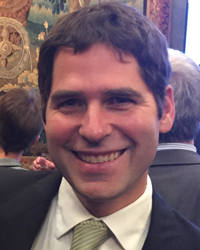 Marcelo Nollmann is CNRS Director at the Center of Structural Biology (CBS) in Montpellier where he is the leader of the group "chromatin biophysics". He obtained a Msc in Physics from the Balseiro Institute (Argentina), and a PhD in Biophysics from the Wellcome Center at the University of Glasgow (UK) where he started his career on the study of enzymes that transport, disentangle and reshape the structure of DNA in cells. After a postdoc at the labs of Nick Cozzarelli, Carlos Bustamante and James Berger in UC Berkeley, he moved to the CBS in 2008 to work on the development and application of novel imaging methods to understand how DNA is organized and remodeled in the cell. He received ERC funding (Starting Grant 2011; Consolidator 2017; Proof of concept 2016, 2019) to work on eukaryotic DNA structure and develop cutting-edge microscopies. He received the 'coup d'elan' prize of Bettencourt-Schueller foundation in 2017 and the 'Etancelin' prize of the French Academy of Sciences in 2019. Currently, his group focuses on the development of high-throughput multiplexing imaging methods to understand how chromosomes are organized in single cells within embryos and tissues and whether this organization has a functional role in transcriptional regulation, and to characterize and understand the roles of cell and sub-cell types in tissues and complex organisms.
Marcelo Nollmann is CNRS Director at the Center of Structural Biology (CBS) in Montpellier where he is the leader of the group "chromatin biophysics". He obtained a Msc in Physics from the Balseiro Institute (Argentina), and a PhD in Biophysics from the Wellcome Center at the University of Glasgow (UK) where he started his career on the study of enzymes that transport, disentangle and reshape the structure of DNA in cells. After a postdoc at the labs of Nick Cozzarelli, Carlos Bustamante and James Berger in UC Berkeley, he moved to the CBS in 2008 to work on the development and application of novel imaging methods to understand how DNA is organized and remodeled in the cell. He received ERC funding (Starting Grant 2011; Consolidator 2017; Proof of concept 2016, 2019) to work on eukaryotic DNA structure and develop cutting-edge microscopies. He received the 'coup d'elan' prize of Bettencourt-Schueller foundation in 2017 and the 'Etancelin' prize of the French Academy of Sciences in 2019. Currently, his group focuses on the development of high-throughput multiplexing imaging methods to understand how chromosomes are organized in single cells within embryos and tissues and whether this organization has a functional role in transcriptional regulation, and to characterize and understand the roles of cell and sub-cell types in tissues and complex organisms.
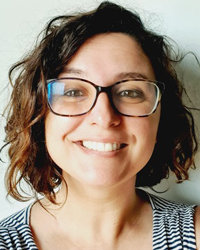 Emma Lazzeri works for Consortium GARR, Italy, on the definition of strategies, tools and on training on topics related to Open Science. She is member of numerous Italian and European working groups in the Open Science field and coordinator of Skills4EOSC, a coordination and support action funded by the European Commission and UK Research and Innovation to create a network of European competence centers for open science. Emma holds a PhD in Innovative Technologies from Scuola Superiore Sant'Anna, Italy, and a degree in Telecommunications Engineering from the University of Pisa, Italy.
Emma Lazzeri works for Consortium GARR, Italy, on the definition of strategies, tools and on training on topics related to Open Science. She is member of numerous Italian and European working groups in the Open Science field and coordinator of Skills4EOSC, a coordination and support action funded by the European Commission and UK Research and Innovation to create a network of European competence centers for open science. Emma holds a PhD in Innovative Technologies from Scuola Superiore Sant'Anna, Italy, and a degree in Telecommunications Engineering from the University of Pisa, Italy.
 After receiving her Ph.D. in Molecular Immunology in 1998, Nina Papavasiliou performed a postdoc with David Schatz at Yale, investigating the mechanism of somatic hypermutation of antibody genes. The end of her postdoc co-incided with the discovery of AID, the cytidine deaminase that catalyzes the hypermutation reaction, and upon starting her own group at the Rockefeller University in New York, she focused on its biochemical and functional characterization. This led to the study of additional deaminases of what has come to be called the AID/APOBEC family, some of which are RNA editing enzymes, and she pivoted into studying RNA editing (initially C-to-U editing and later A-to-I editing by cytidine and adenosine deaminases respectively). In 2017 she moved to the German Cancer Research Center in Heidelberg, Germany where she focuses on epitranscriptomics from the perspective of the basic biology of RNA editing and modification, as well as on therapeutic applications of RNA editing, a topic that she will be addressing here.
After receiving her Ph.D. in Molecular Immunology in 1998, Nina Papavasiliou performed a postdoc with David Schatz at Yale, investigating the mechanism of somatic hypermutation of antibody genes. The end of her postdoc co-incided with the discovery of AID, the cytidine deaminase that catalyzes the hypermutation reaction, and upon starting her own group at the Rockefeller University in New York, she focused on its biochemical and functional characterization. This led to the study of additional deaminases of what has come to be called the AID/APOBEC family, some of which are RNA editing enzymes, and she pivoted into studying RNA editing (initially C-to-U editing and later A-to-I editing by cytidine and adenosine deaminases respectively). In 2017 she moved to the German Cancer Research Center in Heidelberg, Germany where she focuses on epitranscriptomics from the perspective of the basic biology of RNA editing and modification, as well as on therapeutic applications of RNA editing, a topic that she will be addressing here.